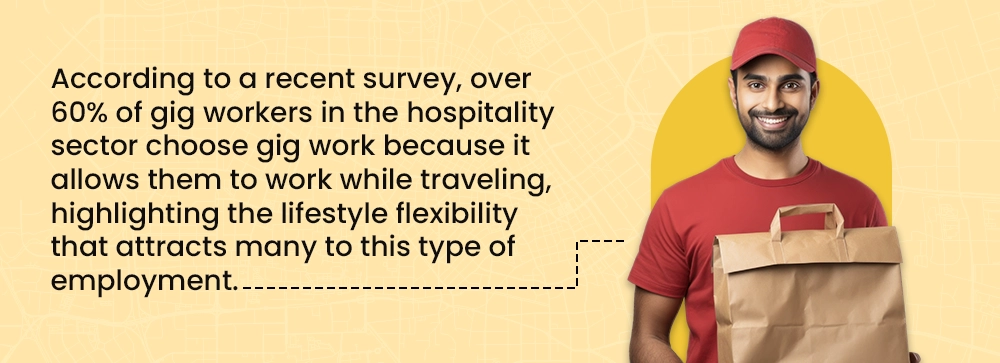Maternity and Paternity Leave in India: Policy, Importance, and Benefits
- Work Culture & Experience


With the rapid transformation of the hospitality industry environment, the entry of gig workers is both a problematic risk and an exciting opportunity for business owners and managers. The shift towards creating a more fluid workforce radically transforms how work is conventionally defined and demands new management approaches.
To thrive in this new world, embracing effective HR solutions for the hospitality sector is critical. Among these, specialist HR software's role in hospitality is becoming increasingly valuable.
Gig workers can be independent contractors, online platform workers, contract firm workers, on-call workers, and temporary workers who enter into formal contracts with on-demand companies to offer services to firm consumers.
For hotels, gig workers can be cooks, waiters, bartenders, housekeepers, and event planners who may work temporarily or per event.
Compared to conventional employees, gig workers are typically not tied to strict timetables and are not given the same benefits as permanent employees, such as medical cover or pension schemes.
Such flexibility in hospitality enables workers to control their workload and working time, fulfilling the contemporary requirement of work-life balance and diversified professional experience.

With its dynamic and fast-paced nature, the hospitality industry has seen a significant increase in the application of gig work. The model offers flexibility attractive to workers who desire control over their work assignments and working hours.
It offers an available talent pool for employers, which is especially beneficial during peak periods or special events.
However, it is challenging to work with such a labor force. The largest problem for most hospitality firms is maintaining the quality of service and operations despite the high staff turnover and variation in employee engagement and experience.
Advanced HR solutions for the hospitality sector bridge this gap, enabling firms to streamline scheduling, communication, and training processes efficiently.
HR hospitality software is designed to meet the industry's specific needs, including managing a geographically dispersed and often temporary workforce. Key aspects of the software are:
The high rate of turnover in hospitality calls for speedy and efficient onboarding. HR software facilitates this by automating onboarding procedures and allowing all documents to be readily accessed digitally.
This accelerates new gig workers' integration and guarantees they are well aware of their roles and responsibilities, which is pivotal in upholding operational standards.
With the heterogeneity of gig workers' schedules and payment arrangements, HR solutions provide features that handle different work terms and facilitate timely and accurate payments.
Various payment schemes—hourly, by task, or flat-fee—are supported by the systems, which integrate time-tracking capabilities to enable automated calculation of wages, minimizing administrative costs and improving payment accuracy.
It takes managing a complex environment of labor laws and contract differences. HR software in hospitality ensures all the details of the contracts are handled properly and the business remains compliant with local, state, and federal regulations.
International operations are of particular concern, where legal standards may differ widely from location to location. The software features automatic updates and notifications when regulatory changes happen.
Effective communication is necessary to retain a scattered workforce. HR software provides multiple features like messaging portals, mobile enablement, and notification tools, enabling effective and consistent communication.
These functionalities keep gig workers connected and engaged despite their physical office absence. They also ensure the transmission of critical information, collection of worker feedback, and community building.
Service excellence is sustained through ongoing monitoring and enhancement of worker performance. HR software features performance monitoring tools that enable managers to track service quality, detect areas for improvement, and offer focused feedback and training to gig workers. The tools typically have customizable metrics and real-time reporting capabilities, which help managers respond quickly and effectively to issues.
Recruiting and retaining great talent in the gig economy relies mostly on what benefits and incentives are provided. HR software allows companies to automate and provide various benefits for gig workers, including flexible work arrangements, medical insurance choices, and reward schemes.
These types of benefits play a vital role in increasing the satisfaction and allegiance of workers, hence lowering employee turnover and cultivating a more permanent and dedicated pool of workers.
Globally, the gig economy in the hospitality industry has recorded strong growth. In Europe, for instance, gig workers now make up a large percentage of the workforce in tourism-driven countries such as Italy and Spain. The employees are inclined to do several gigs; thus, efficient HR processes become imperative for workers and employers.
In the United States, legislation like California's Assembly Bill 5 has changed the gig worker classification, impacting hospitality firms' hiring and management. The evolving regulatory landscape makes flexible HR software more indispensable than ever.

As the hospitality sector grows, so does the technology that controls its workforce. HR solutions for the hospitality industry are about automation and making the work environment more integrated and responsive. The tools assist companies in surviving and thriving by giving them the agility to respond to market needs promptly.
The proliferation of gig workers in hospitality is not merely a trend but a profound realignment towards a more agile and resilient business model. With the aid of powerful hospitality HR software, companies can be assured of being able to manage the intricacies of this new workforce dynamic.
As we venture into the future of work in this industry, HR HUB emerges as a pioneer solution, with advanced features designed to meet the distinctive requirements of hospitality companies. Through HR HUB, labor management becomes less about handling unpredictability and more about capturing potential in a dynamic marketplace.
In the dynamic hospitality world, being ahead means being agile. With the right tools and strategies, companies can ensure that they survive and thrive on the gig economy's potential.